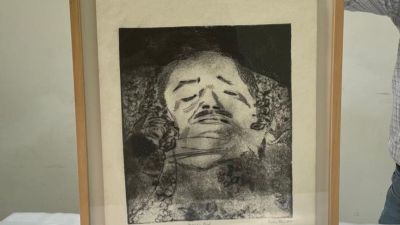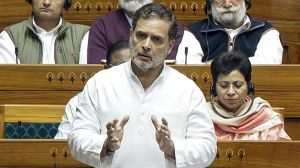Sipper and straw, to mosquito nets and phone calls: Elgar accused in court for relief
Varavara Rao is currently on bail on medical grounds, and had challenged in the Supreme Court the High Court order rejecting his appeal.
 Activist P Varavara Rao. (PTI)
Activist P Varavara Rao. (PTI)The Supreme Court Tuesday extended activist P Varavara Rao’s interim bail till further orders, on the day the 83-year-old was supposed to surrender after the Mumbai High Court refused his plea for permanent medical bail.
The apex court said it will hear the Bhima Koregaon case accused’s plea for permanent medical bail on July 19. Rao is currently on bail on medical grounds, and had challenged in the Supreme Court the High Court order rejecting his appeal.
The case relates to alleged inflammatory speeches made at the Elgar Parishad conclave held in Pune on December 31, 2017, which police claim triggered violence the next day near the Bhima Koregaon war memorial near Pune.
In his plea seeking permanent medical bail, Rao’s counsel said “any further incarceration would ring the death knell for him as advancing age and deteriorating health are a fatal combination”. The counsel also cited that the high court had denied his prayer to shift the trial to Hyderabad.
Rao was arrested on August 28, 2018, first put under house arrest following an order of the apex court, and then taken into custody on November 17, 2018, and shifted to Taloja Jail in Navi Mumbai.
Among other conditions, Rao’s lawyers have cited an umbilical hernia for which he had to undergo surgery, cataract in both eyes, and neurological problems. They have also given the example of another accused, Jesuit priest Stan Swamy, who died while in custody, reportedly for lack of adequate medical attention.
Incidentally, the High Court had also noted the claims made by Rao’s counsel on the lack of medical facilities at the Taloja prison and the poor hygienic conditions there, saying there was substance in the argument.
In the trial in the case, the Elgar Parishad accused have repeatedly brought up the lack of facilities in prison, and denial of access to the same.
Sipper and straw: In November 2020, lawyers representing Jharkhand-based tribal rights activist and Jesuit priest Father Stan Swamy had approched the special court seeking that the National Investigation Agency (NIA) return a straw and sipper packed by his colleagues for the 83-year-old suffering from Parkinson’s disease at the time of his arrest on October 7, 2020.
The NIA said that after his arrest, a personal search of Swamy was conducted and no straw or sipper were found. After this submission, the court rejected Swamy’s plea, while allowing his lawyers to file a separate plea seeking a new set of straw and sipper. The lawyers then made a plea and also sought winter wear for Swamy. After there was widespread criticism over Swamy being denied something as basic as a straw and sipper, which also drew a notice from the State Human Rights Commission, the jail authorities submitted that they were providing Swamy with “a wheelchair, walking stick, walker, commode chair, sipper mug, sipper bottle, straws, battery cells for his hearing machine”.
Swamy passed away on July 5, 2021, at a private hospital while still in judicial custody, with his medical bail plea pending.
Books: In 2020, lawyer-activist Sudha Bharadwaj filed an application before the special court that she was not being allowed access to books. She said that when books were sent for her, the Superintendent at Byculla Jail in Mumbai, where she was housed, refused to receive them for her.
The special court allowed her plea to have access to five books per month from outside prison, while directing the jail superintendent to “carefully examine” the books to ensure they did not contain any “objectionable material”. It said that beyond the prescribed parameters to deem a book’s content “objectionable” — including whether it is vulgar, obscene or preaches violence — a superintendent did not have powers to withhold a book from a detainee.
A few days later, a similar plea for books was made by fellow accused Gautam Navlakha, 70, a journalist-activist, arrested in April 2020, and Delhi University associate professor Hany Babu, 56, held in July 2020. The two men submitted that parcels containing books for them were returned with an endorsement stating “Covid Suraksha” by the Taloja Jail authorities – in other words, on grounds of Covid-19 pandemic and issues relating to such parcels from outside. The court accepted the prison’s decision, and said books could be delivered to them physically by relatives or near and dear ones.
Similar pleas by co-accused Professor Shoma Sen of Nagpur University, 64, arrested in June 2018, and Jyoti Jagtap, 34, held for association with alleged pro-Maoist group Kabir Kala Manch, were allowed, subject to them submitting a list of the books they wanted access to.
On December 1, 2021, Bharadwaj, 60, was released on ‘default’ bail – the first and so far only one of the Elgar Parishad accused to get bail.
Phone call: Navlakha, who is lodged in the Taloja Central Jail since April 2020, approached the special court earlier this year seeking permission to make phone / video calls to his family member. The prison department told the court that the Maharashtra Prison Manual does not have provisions to allow an undertrial prisoner to make phone calls. The prison said that the facility was started only during the Covid-19 pandemic and it could not be permitted to undertrials on a regular basis. The court rejected Navlakha’s plea, following which he filed an appeal in the High Court.
Hearing the petition last week, the High Court asked the Maharashtra Prison Department to clarify whether Navlakha is entitled to phone calls or video calls from prison.
Ayurvedic medicines: Lawyer Surendra Gadling, arrested in June 2018, appealed that he was not allowed access to his Ayurvedic medicines despite being permitted the same by a court order, which said he could have them following advice from the prison’s medical office. He said he had been using the medicines since 2018, till November 2021, when his son was not allowed to give them to him. The court said that the superintendent had no reason to disallow the medicines, and that these could be inspected for ‘authenticity’.
In August 2021, Gadling was let out for eight days to attend one-year death rituals of his mother. He had been denied bail at the time of death.
Mosquito nets: Navlakha and artist Sagar Gorkhe, 34, last month made an application before the special court that the prison authorities had taken away the mosquito nets they were using. Navlakha said he had been advised the use the nets by the medical officer in the prison, but during a security check in May, the nets were taken away. Both said that the prison was mosquito-infested and they were apprehensive of contracting diseases. The prison authorities told the court that the nets with their long strings could be misused by inmates to harm themselves or others and hence could not be allowed.
The court did not allow the pleas of Navlakha and Gorkhe, who was arrested in September 2020, but directed the jail superintendent to take ‘all necessary precautions against mosquitoes’, conduct fumigation, allow inmates to use repellents, ointments and incense sticks.
Fresh air: Navlakha made an application to be let out of anda cell, where he was transferred in October 2021, for fresh air. His plea submitted that the anda cell had restricted his movement and since he is a senior citizen, in the absence of fresh air, his mental and physical health could suffer. In March, the court allowed his plea and directed the jail authorities to let him out for 30 minutes a day for fresh air and light, in the presence of a prison guard.
Chair, cot, laptop: Gadling sought access to a plastic chair and table saying that, due to his medical ailments, he was unable to squat on the floor for long without developing pain in his back and neck. He sought the table and chair saying he needed to do a lot of studying as he was representing himself in the case. Prison authorities opposed it, citing security risks.
The court agreed with Gadling’s contention, observing that the allegations he has to defend himself against are serious and there are a large number of documents he needs to study for hours together. He was allowed a chair and table at his cost.
Gadling also sought access to a laptop to prepare his defence. Prison authorities again cited a security risk. The court rejected this plea, stating that similar access may be sought by other undertrials, leading to the possibility of misuse and the risk to security of the prison. He was however allowed to use the computer available in the jail for an hour twice a week.
An application was made by academician Anand Teltumbde, 72, arrested in April 2020, for a cot. He submitted that due to medical ailments related to his cervical vertebrae, he was allowed a steel cot and a soft mattress in the hospital ward of the jail. Shifted to a high-security cell, he no longer had access to them, Teltumbde pleaded. The court allowed the plea, considering his age and medical conditions.
Shaving kit: Gadling sought to be permitted his own shaving kit. He submitted that while there was a person assigned to cut hair and shave prisoners, a common blade was used and hence it was unhygienic. The prison again cited security risk in allowing prisoners access to a blade.
The court agreed with this contention, stating that if every prisoner is allowed such access, “it will be very difficult to manage the situation”.
- 01
- 02
- 03
- 04
- 05































